Find Help
More Items From Ergsy search
-
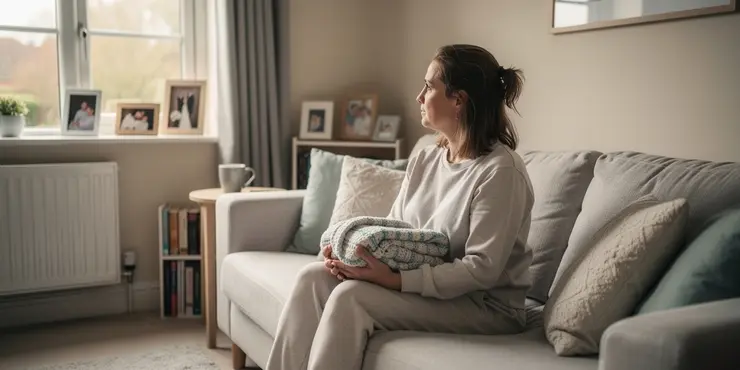
Postnatal Depression
Relevance: 100%
-

What is postnatal depression?
Relevance: 96%
-

Is postnatal depression preventable?
Relevance: 93%
-

How is postnatal depression diagnosed?
Relevance: 92%
-
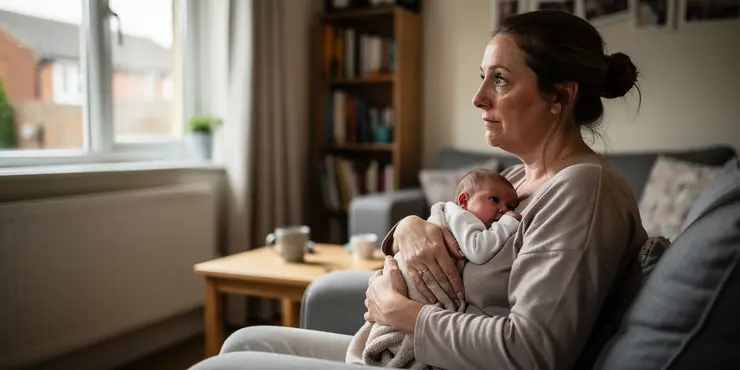
What causes postnatal depression?
Relevance: 92%
-
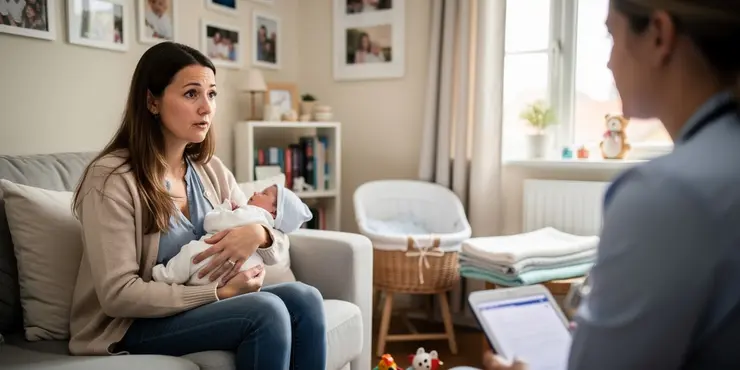
Are there treatments available for postnatal depression?
Relevance: 92%
-
Is postnatal depression a long-term condition?
Relevance: 92%
-
Postnatal Depression - Leanne's Story
Relevance: 91%
-

What are the symptoms of postnatal depression?
Relevance: 91%
-

Are there support groups for postnatal depression?
Relevance: 89%
-

Can fathers experience postnatal depression?
Relevance: 89%
-

Is medication necessary for treating postnatal depression?
Relevance: 87%
-

Can diet impact postnatal depression?
Relevance: 86%
-

Can lifestyle changes help with postnatal depression?
Relevance: 85%
-
Can postnatal depression recur after treatment?
Relevance: 85%
-
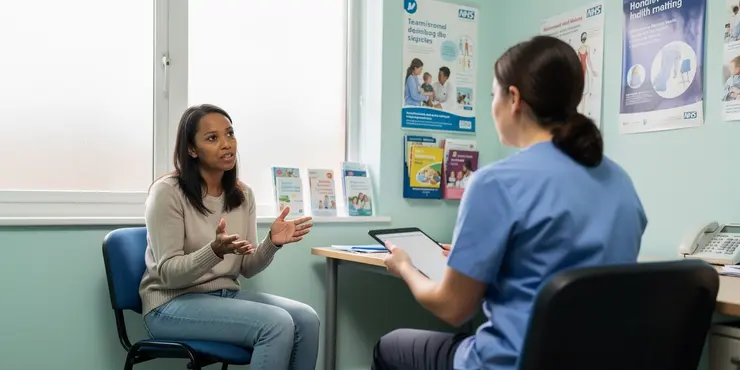
Can postnatal depression affect subsequent pregnancies?
Relevance: 84%
-
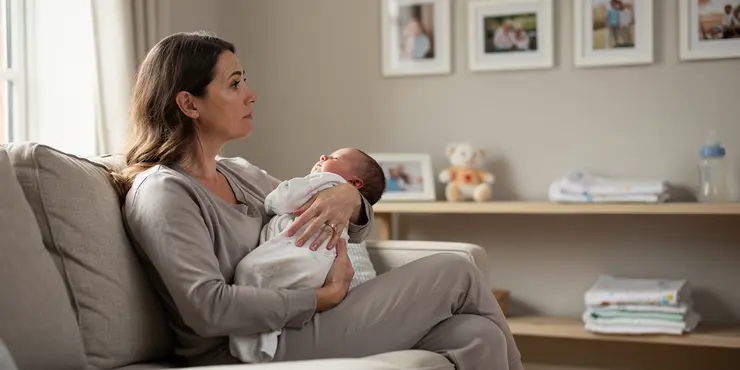
How do I know if I have postnatal depression? | NHS
Relevance: 83%
-
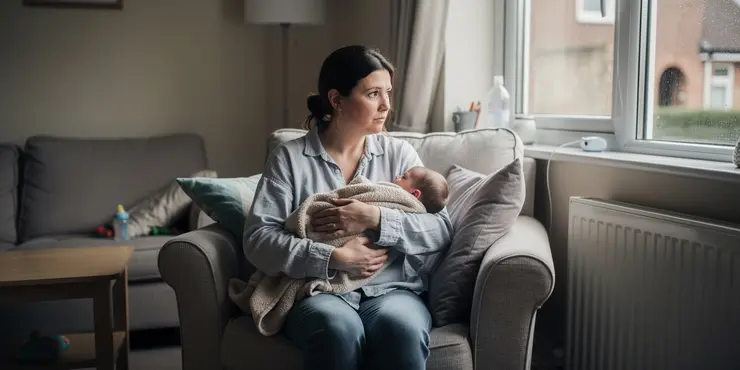
Should someone with postnatal depression seek professional help?
Relevance: 83%
-

How is postnatal depression different from the 'baby blues'?
Relevance: 82%
-
What should I do if I suspect I have postnatal depression?
Relevance: 82%
-

How does postnatal depression affect bonding with the baby?
Relevance: 82%
-

How can family members support someone with postnatal depression?
Relevance: 75%
-

How soon after childbirth can postnatal depression occur?
Relevance: 57%
-
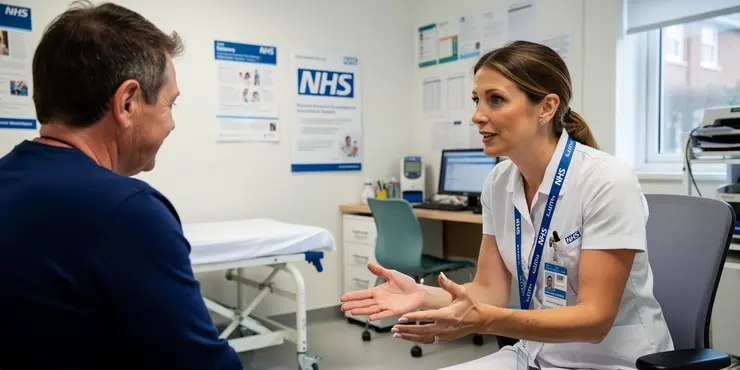
Treating anxiety and depression - www.slam.nhs.uk
Relevance: 39%
-
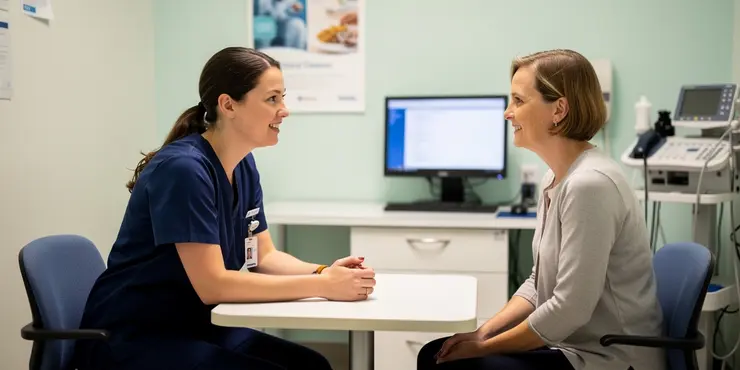
How can a relationship contribute to depression?
Relevance: 38%
-

Clinical depression: Lawrence's story | NHS
Relevance: 37%
-
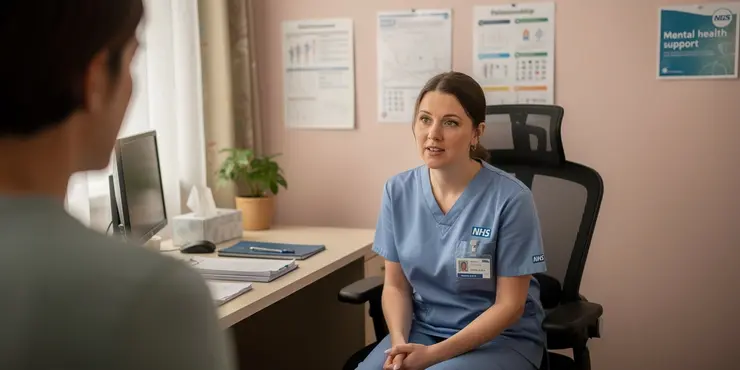
Can physical symptoms be linked to relationship-induced depression?
Relevance: 36%
-

Are there any self-care strategies to cope with relationship-induced depression?
Relevance: 36%
-

What are the signs that my relationship is making me depressed?
Relevance: 35%
-

7 Signs Your Relationship is Making You Depressed
Relevance: 35%
-

I couldn't celebrate Hibs beating Hearts because I was that depressed
Relevance: 35%
-

What role do unhealthy dynamics play in causing depression?
Relevance: 35%
-

What should I do if my partner dismisses my feelings of depression?
Relevance: 29%
-

Postpartum Health: Mother and Baby
Relevance: 28%
-

How quickly can ketamine alleviate depression symptoms?
Relevance: 26%
-

Should I seek professional help if my relationship is making me depressed?
Relevance: 24%
-

Can ketamine be used to treat major depressive disorder?
Relevance: 18%
-
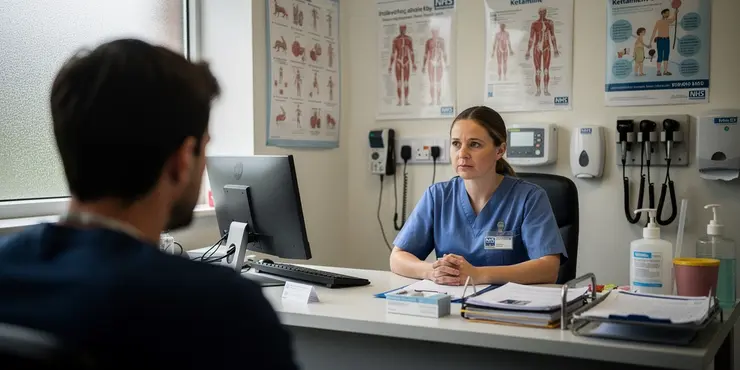
Are there any legal uses for ketamine?
Relevance: 17%
-

How long does it take to recover from a Caesarean birth?
Relevance: 16%
-

How is ketamine different from traditional antidepressants?
Relevance: 16%
Postnatal Depression - Leanne's Story
Introduction to Postnatal Depression
Postnatal depression (PND) is a type of mood disorder that affects new mothers. It's characterized by feelings of sadness, low energy, and difficulty bonding with the baby. In the United Kingdom, it is estimated that 1 in 10 women experience PND in the first year after childbirth.Leanne's Journey
Leanne, a young mother from Manchester, found herself overwhelmed shortly after giving birth to her son, Ethan. The initial joy quickly gave way to fatigue, sadness, and a sense of isolation. Despite having a supportive partner and family, Leanne struggled to express her emotions and found it difficult to connect with her newborn.Recognizing the Signs
Leanne's symptoms included prolonged bouts of crying, irritability, and a lack of interest in activities she once enjoyed. She also faced difficulty sleeping and experienced changes in her appetite. These signs are common indicators of postnatal depression, which goes beyond the "baby blues" that many new mothers experience.Seeking Help
Initially, Leanne was reluctant to seek help, fearing judgment and feeling like a failure as a mother. However, her partner encouraged her to speak to her GP, who referred her to a mental health specialist. In the UK, GPs often serve as the first point of contact for women experiencing PND and can provide access to various support services.Treatment and Support
Leanne's treatment involved a combination of antidepressants and cognitive behavioural therapy (CBT). She also attended support groups for new mothers, where she met others experiencing similar challenges. These resources, available through the NHS and local community groups, played a crucial role in her recovery.The Importance of Awareness
Leanne's story highlights the importance of recognizing and addressing postnatal depression. Awareness and understanding of PND can help new mothers seek timely help and reduce the stigma associated with mental health issues. For those in the UK, organisations like Mind and the Association for Postnatal Illness offer valuable information and support.Conclusion
Postnatal depression is a serious condition but with proper support and treatment, recovery is possible. Leanne's journey serves as a reminder that reaching out for help is a sign of strength. If you or someone you know is experiencing symptoms of PND, don't hesitate to seek assistance from healthcare professionals.Postnatal Depression - Leanne's Story
What is Postnatal Depression?
Postnatal depression (PND) is when new moms feel very sad after having a baby. They might feel tired all the time and find it hard to love or care for their baby. In the UK, about 1 in 10 new moms feel this way in the first year after having a baby.Leanne's Story
Leanne is a mom from Manchester. After her baby Ethan was born, Leanne was very happy at first. But soon she felt very tired, sad, and alone. Even though her family wanted to help her, she found it hard to talk about her feelings. She also found it hard to feel close to her baby.How to Spot Postnatal Depression
Leanne cried a lot and got angry easily. She did not want to do things she used to like. She couldn't sleep well and didn't eat the same. These are signs of postnatal depression, which is more serious than the "baby blues" many moms get.Getting Help
At first, Leanne didn't want to get help because she was scared people would think she was a bad mom. But her partner told her to talk to the doctor. The doctor, called a GP in the UK, sent her to a special doctor who can help with feelings. GPs can help moms find the right support when they feel like this.Treatment and Support
Leanne took medicine to feel better and talked to someone in therapy. She also went to a group with other new moms who felt the same. These groups helped her a lot. You can find help through the NHS and local groups.Why Knowing About PND is Important
Leanne’s story shows it is important to know about this kind of sadness. When people understand PND, moms can ask for help sooner. This is important because it shows that mental health is just as important as physical health. In the UK, groups like Mind can help with information and support.Conclusion
Postnatal depression is serious, but moms can feel better with the right help. Leanne’s story reminds us that asking for help is brave. If you or someone you know feels these things, talk to a doctor or find a support group.Frequently Asked Questions
What is postnatal depression?
Postnatal depression (PND) is a type of mood disorder that affects parents, mostly mothers, after childbirth. It can manifest through feelings of extreme sadness, anxiety, and exhaustion that makes it difficult to carry out daily tasks.
What are the symptoms of postnatal depression?
Symptoms of postnatal depression include persistent sadness, lack of enjoyment, anxiety, lack of energy, difficulty bonding with your baby, and withdrawing from others. Everyone may experience different symptoms, and they can vary in severity.
How common is postnatal depression in the UK?
Postnatal depression is relatively common in the UK, affecting about 1 in 10 women within the first year after childbirth. Fathers and partners can also experience postnatal depression, though it is less common.
How soon after giving birth can postnatal depression occur?
Postnatal depression can develop at any time during the first year after giving birth, though it commonly starts during the first few months post-delivery.
What are the risk factors for postnatal depression?
Risk factors for developing postnatal depression include a history of mental health issues, stressful life events, lack of support, and complications during childbirth.
How is postnatal depression diagnosed?
A healthcare professional, such as a GP or mental health specialist, can diagnose postnatal depression based on your symptoms. They may ask about your thoughts, feelings, and emotional state to make an assessment.
Can postnatal depression be treated?
Yes, postnatal depression can be treated. Treatment options include counselling, cognitive behavioural therapy (CBT), antidepressant medications, and support groups.
How long does postnatal depression last?
The duration of postnatal depression varies from person to person. With treatment, many individuals start feeling better within a few months, but for some, it may take longer. On average, postnatal depression can last for about 6 months to a year.
What should I do if I suspect I have postnatal depression?
If you suspect you have postnatal depression, it’s important to speak to a healthcare professional, such as your GP or health visitor. Early intervention can help manage symptoms and improve your wellbeing.
Can postnatal depression affect my baby?
Untreated postnatal depression can affect your ability to bond with and care for your baby, potentially leading to developmental and emotional issues. Seeking help early can mitigate these effects.
Is it normal to feel this way after having a baby?
It is common to have a range of emotions after childbirth, including the 'baby blues,' which are normal and typically resolve within two weeks. However, if feelings of sadness and anxiety persist, it could be a sign of postnatal depression.
What support is available for postnatal depression in the UK?
In the UK, support for postnatal depression includes NHS services, helplines, support groups, and charities like PANDAS Foundation. Your GP can also connect you with local support resources.
Can fathers experience postnatal depression?
Yes, fathers and partners can also experience postnatal depression. It is important for fathers to seek support if they are experiencing symptoms similar to maternal postnatal depression.
How can family and friends support someone with postnatal depression?
Family and friends can support someone with postnatal depression by offering practical help, being understanding and non-judgmental, encouraging them to seek professional help, and providing emotional support.
Can postnatal depression be prevented?
While it may not be entirely preventable, steps can be taken to reduce the risk of postnatal depression. These include maintaining good physical health, seeking support, and addressing any pre-existing mental health issues before childbirth.
What is feeling sad after having a baby?
Sometimes, after a mom has a baby, she might feel very sad or upset. This is called feeling sad after having a baby. It can happen to lots of moms.
If you feel this way, it is okay. It is important to tell someone you trust, like a family member or a doctor. They can help you feel better.
Remember, you are not alone. There are people and tools that can help you, like talking to a counselor or using apps that help you relax.
After having a baby, some parents feel very sad and tired. This is called postnatal depression (PND). It mostly happens to mothers. PND can make you feel very sad, worried, and too tired, making it hard to do everyday things.
How do you feel if you have postnatal depression?
If you have postnatal depression, you might feel sad or worried.
You could feel very tired and don't want to do things.
You might cry a lot or feel angry.
You may not enjoy looking after your baby.
It can help to talk to someone you trust.
Try using tools like a feelings chart to show how you feel.
Drawing or writing down your feelings might also help.
After having a baby, some people feel very sad. This is called postnatal depression. If you have this, you might:
- Feel sad all the time.
- Not enjoy things anymore.
- Feel worried or nervous.
- Have no energy.
- Find it hard to feel close to your baby.
- Want to be alone and not see other people.
Not everyone feels the same way if they have postnatal depression. Some people feel it more strongly than others.
If it's hard to read or remember things, you can try:
- Reading out loud.
- Using audiobooks.
- Asking someone to explain the information to you.
- Highlighting important words.
How many new mums get sad after having a baby in the UK?
Many mums feel sad or worried after having a baby. This is called "postnatal depression." In the UK, about 1 in every 10 mums can get this.
If you or someone you know feels this way, it is good to talk to a doctor or a nurse. They can help you feel better. You can also talk to friends or family about how you are feeling.
There are also apps and websites that can help. They have tips to make you feel better.
After having a baby, some mums feel very sad. This happens to about 1 out of every 10 mums in the UK in their first year after the baby is born. Dads and partners can feel this way too, but it doesn't happen as often.
When can postnatal depression start after having a baby?
Postnatal depression is when a new mom feels very sad.
This can happen after having a baby.
It can start any time in the first year after the baby is born.
It is important to talk to someone if you feel very sad.
Family and friends can help.
A doctor can also help you feel better.
Postnatal depression is when parents feel very sad after having a baby. This can happen in the first year after a baby is born. It usually starts a few months after the baby comes.
What can make postnatal depression more likely?
Some things can make it easier to have postnatal depression:
- Feeling very worried or stressed
- Not having much help from family or friends
- Having a sad feeling before having a baby
- Big changes, like moving to a new home
- If postnatal depression runs in the family
Talk to someone if you feel sad. A doctor or a counselor can help.
You can also try things like:
- Writing down your feelings in a diary
- Breathing slowly to relax
- Taking a break to do something fun
If you have had problems with your mental health before, big life changes that are hard, not enough help from others, or if there were problems when the baby was born, you might get sad after having a baby.
How do doctors know if someone has postnatal depression?
Doctors ask questions about how a person feels after having a baby. They might give you a simple test to check your mood.
If you feel sad or worried after having your baby, talk to a doctor or nurse. They can help you find out if you need help.
A doctor or a nurse can find out if you have postnatal depression by asking you questions about how you think and feel. They will listen to you and help you understand your emotions.
Can you help someone feel better after having a baby?
Yes, you can help someone feel better if they are sad after having a baby. Doctors, nurses, and therapists can all help. Talking to someone who listens can make a big difference. There are also medicines that can help someone feel better.
Some things that can help include: - Talking to a friend or a doctor. - Getting enough sleep and rest. - Joining a support group for parents. - Doing things you enjoy every day.
If you know someone who feels sad after having a baby, tell them it's okay to ask for help.
Yes, after a baby is born, a new mom can feel very sad. This is called postnatal depression, and you can get help for it. There are different ways to feel better:
- Talking to someone who can help, like a counselor.
- Going to special meetings called cognitive behavioural therapy (CBT), where you learn to think happier thoughts.
- Taking medicine that helps you feel better, called antidepressants.
- Joining a group of other moms who also feel this way, so you can help each other.
How long does feeling sad after having a baby last?
Postnatal depression is feeling very sad after having a baby. How long it lasts is different for everyone. With help, most people start feeling better in a few months. For some people, it might take longer. Usually, postnatal depression can last around 6 months to a year.
What if I think I have postnatal depression?
If you feel very sad after having a baby, you might have postnatal depression.
Here are some things you can do:
- Talk to your doctor. They can help you feel better.
- Tell your family or friends how you feel. They can support you.
- Look after yourself. Try to rest and eat well.
It is okay to ask for help. You are not alone.
If you think you might have postnatal depression, it is important to talk to a doctor or nurse. Getting help early can make you feel better and happier.
Can feeling very sad after having a baby affect my baby?
Feeling very sad after having a baby is called postnatal depression. It can make it hard to look after your baby. But here are some ways to help:
- Talk to a doctor or nurse. They can help you feel better.
- Ask family or friends for help with the baby.
- Try to rest when the baby is sleeping.
- Find a group of other parents to talk to. You can help each other.
If you don't get help for feeling very sad after having a baby, it can be hard to connect with and take care of your baby. This can cause problems for your baby's growth and feelings. Getting help quickly can make things better.
Is it okay to feel this way after having a baby?
It is normal to have many different feelings after having a baby. You might feel happy, sad, tired, or worried. Everyone is different.
If you feel worried and need help, talking to someone can be good. You can talk to a friend, family member, or a doctor. They can listen and help you feel better.
Here are some things that might help:
- Take deep breaths to relax.
- Try to rest when the baby sleeps.
- Eat healthy foods and drink water.
- Ask for help if you need it.
Remember, you are not alone, and it is okay to ask for help.
After having a baby, it is normal to feel different emotions. You might feel sad or have the 'baby blues.' This usually goes away in two weeks.
But if you feel sad or worried for longer, it might be postnatal depression. You might need help to feel better.
Talking to someone you trust or using helpful apps can make a difference. Drawing, writing, or walking outside can also help you feel better. Remember, you are not alone, and people are there to help.
What help can you get for postnatal depression in the UK?
If you feel sad after having a baby, there are people who can help you. This is called "postnatal depression."
Here are some ways to get help:
- Talk to your doctor. They can give you advice and medicine if you need it.
- Speak with a nurse who visits new mums. They are called "health visitors."
- Join a group for new mums. You can meet other mums and talk about how you feel.
- Call a helpline for mums. They can listen and help you on the phone.
Remember, you are not alone, and it's okay to ask for help.
In the UK, there is help for new parents feeling sad after having a baby. You can get help from doctors, phone lines, groups of people who talk together, and charities like PANDAS Foundation. Your doctor can help you find these groups nearby.
Can dads feel sad after a new baby comes?
Yes, dads can feel sad after a new baby is born. This is called feeling "down" or like having "the blues." It's not just moms who can feel this way.
Here are some ways to feel better:
- Talk to a friend or family member.
- See a doctor or a therapist.
- Ask for help with the baby.
- Take time for yourself, like going for a walk or doing something you like.
If you or someone you know is feeling very sad, it is important to ask for help. It's okay to talk about feelings.
Dads and partners can feel sad after a baby is born, just like mums. If dads are feeling sad, they should talk to someone and get help.
How can family and friends help someone with postnatal depression?
Having a baby is a big change, and sometimes new parents feel very sad after. This is called postnatal depression. It is important for family and friends to help. Here are some ways to help:
- Listen: Be there to listen if the new parent wants to talk.
- Be patient: Understand that they may need time to feel better.
- Help at home: Offer to do some house chores like cooking or cleaning.
- Spend time: Visit them and spend some time together.
- Encourage rest: Remind them to rest and take care of themselves.
- Seek help: Help them find a doctor or a counselor if they need it.
Supportive tools can include talking to a doctor, joining a support group, and using apps that help with mood. Family and friends play a big role in helping someone feel better.
Family and friends can help someone who feels sad after having a baby. They can do things to help, be kind and not judge, suggest seeing a doctor, and be there to listen and care.
Can we stop feeling very sad after having a baby?
Having a baby is a big change. Some mums feel very sad after giving birth. This is called postnatal depression.
Here are some ways to help:
- Talk to someone. It could be a friend, family, or a doctor.
- Get plenty of rest and eat healthy food.
- Ask for help with the baby when you feel tired.
- Try to do things you enjoy to relax.
If you feel very sad for a long time, it is important to talk to a doctor.
The doctor can help you feel better.
You can't always stop postnatal depression, but you can do things to help. Stay healthy, ask for help, and talk to someone if you already have mental health problems before having your baby.
Useful Links
This website offers general information and is not a substitute for professional advice.
Always seek guidance from qualified professionals.
If you have any medical concerns or need urgent help, contact a healthcare professional or emergency services immediately.
Some of this content was generated with AI assistance. We’ve done our best to keep it accurate, helpful, and human-friendly.
- Ergsy carfully checks the information in the videos we provide here.
- Videos shown by Youtube after a video has completed, have NOT been reviewed by ERGSY.
- To view, click the arrow in centre of video.
- Most of the videos you find here will have subtitles and/or closed captions available.
- You may need to turn these on, and choose your preferred language.
- Go to the video you'd like to watch.
- If closed captions (CC) are available, settings will be visible on the bottom right of the video player.
- To turn on Captions, click settings .
- To turn off Captions, click settings again.
More Items From Ergsy search
-

Postnatal Depression
Relevance: 100%
-

What is postnatal depression?
Relevance: 96%
-

Is postnatal depression preventable?
Relevance: 93%
-

How is postnatal depression diagnosed?
Relevance: 92%
-

What causes postnatal depression?
Relevance: 92%
-

Are there treatments available for postnatal depression?
Relevance: 92%
-
Is postnatal depression a long-term condition?
Relevance: 92%
-
Postnatal Depression - Leanne's Story
Relevance: 91%
-

What are the symptoms of postnatal depression?
Relevance: 91%
-

Are there support groups for postnatal depression?
Relevance: 89%
-

Can fathers experience postnatal depression?
Relevance: 89%
-

Is medication necessary for treating postnatal depression?
Relevance: 87%
-

Can diet impact postnatal depression?
Relevance: 86%
-

Can lifestyle changes help with postnatal depression?
Relevance: 85%
-
Can postnatal depression recur after treatment?
Relevance: 85%
-

Can postnatal depression affect subsequent pregnancies?
Relevance: 84%
-

How do I know if I have postnatal depression? | NHS
Relevance: 83%
-

Should someone with postnatal depression seek professional help?
Relevance: 83%
-

How is postnatal depression different from the 'baby blues'?
Relevance: 82%
-
What should I do if I suspect I have postnatal depression?
Relevance: 82%
-

How does postnatal depression affect bonding with the baby?
Relevance: 82%
-

How can family members support someone with postnatal depression?
Relevance: 75%
-

How soon after childbirth can postnatal depression occur?
Relevance: 57%
-

Treating anxiety and depression - www.slam.nhs.uk
Relevance: 39%
-

How can a relationship contribute to depression?
Relevance: 38%
-

Clinical depression: Lawrence's story | NHS
Relevance: 37%
-

Can physical symptoms be linked to relationship-induced depression?
Relevance: 36%
-

Are there any self-care strategies to cope with relationship-induced depression?
Relevance: 36%
-

What are the signs that my relationship is making me depressed?
Relevance: 35%
-

7 Signs Your Relationship is Making You Depressed
Relevance: 35%
-

I couldn't celebrate Hibs beating Hearts because I was that depressed
Relevance: 35%
-

What role do unhealthy dynamics play in causing depression?
Relevance: 35%
-

What should I do if my partner dismisses my feelings of depression?
Relevance: 29%
-

Postpartum Health: Mother and Baby
Relevance: 28%
-

How quickly can ketamine alleviate depression symptoms?
Relevance: 26%
-

Should I seek professional help if my relationship is making me depressed?
Relevance: 24%
-

Can ketamine be used to treat major depressive disorder?
Relevance: 18%
-

Are there any legal uses for ketamine?
Relevance: 17%
-

How long does it take to recover from a Caesarean birth?
Relevance: 16%
-

How is ketamine different from traditional antidepressants?
Relevance: 16%


